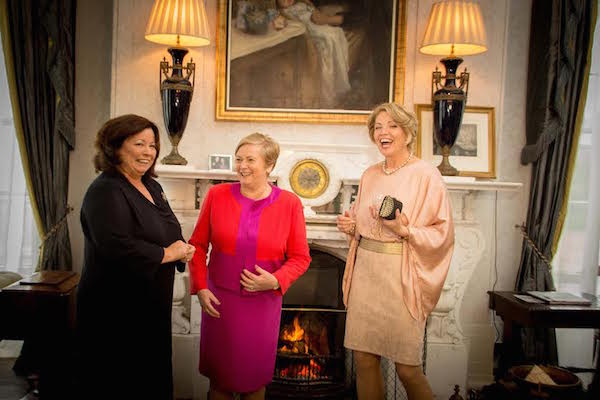
Former Tanaiste, Mary Harney, Tanaiste, Frances Fitzgerald T.D.and Minister for Justice and Equality, and Former Tanaiste Mary Coughlan, are part of a group of current and former female government ministers, that gathered at Lissadell House in Sligo, to commemorate the 89th anniversary of the death of Countess Markievicz.Photo: James Connolly15JUL16
FORMER Tanaiste and ex-TD for Donegal Mary Coughlan was among a very special collection of women for dinner last night – Ireland’s only female ministers.
Mary is one of just 17 women to have held a cabinet position in this country since the foundation of the State.
And last night she joined 13 of them at historic Lissadell House in north Sligo for a dinner to commemorate the life of the country’s first female minister; Countess Constance Markievicz, 89 years to the day after her death.
Lissadell was the childhood home of Countess Markievicz and her sister Eva Gore-Booth and was immortalised in the poetry of Ireland’s greatest poet William Butler Yeats, awarded the Nobel Prize for literature in 1923 “for his always inspired poetry which .. gives expression to the spirit of a whole nation”.
The owner of Lissadell Constance Cassidy said: “This historic meeting also honours the memory of Eva Gore-Booth, suffragist and poet, who fought all her life to better the condition of working women and for women’s suffrage. The achievement of the Gore-Booth sisters was the legislative change allowing women both to stand for election and to vote.
“One hundred and twenty years ago Constance and Eva stood on a platform in Drumcliff, Sligo, campaigning for women’s rights.
“For this they were mocked and derided. Constance and Eva would be so proud to see so many women ministers and former ministers at Lissadell. They would be so proud that one such minister currently holds the office of Tánaiste, as two women had before her Mary Harney and Donegal’s Mary Coughlan.
“Today is the 89th anniversary of the death of Countess Markievicz and today at Lissadell we celebrate the memory and achievements of this great Irish patriot with a historic gathering of women who have held or currently hold cabinet positions.
“We also celebrate the achievements of women in public office in Ireland since the election of the first woman – Countess Markievicz of Lissadell – to the Westminster parliament in 1918, the first general election that permitted women to vote and to stand for election, and her appointment as Minister for Labour in the first Dáil of 1919 – 1921.”

Tags:







